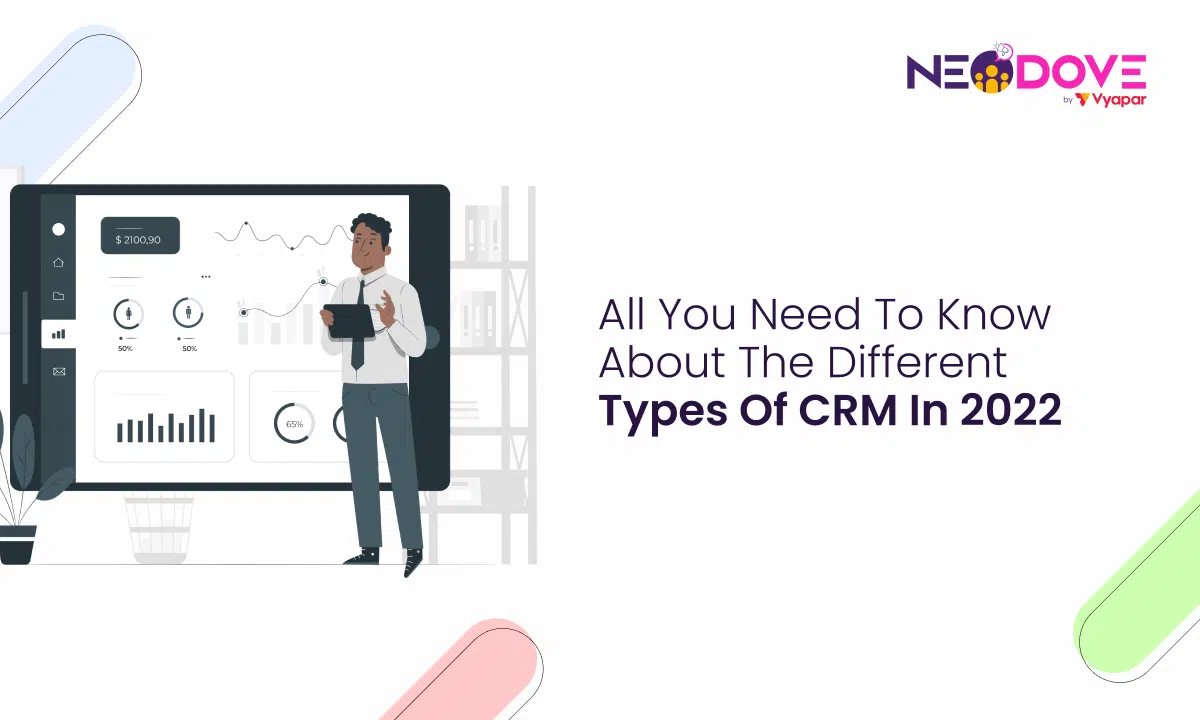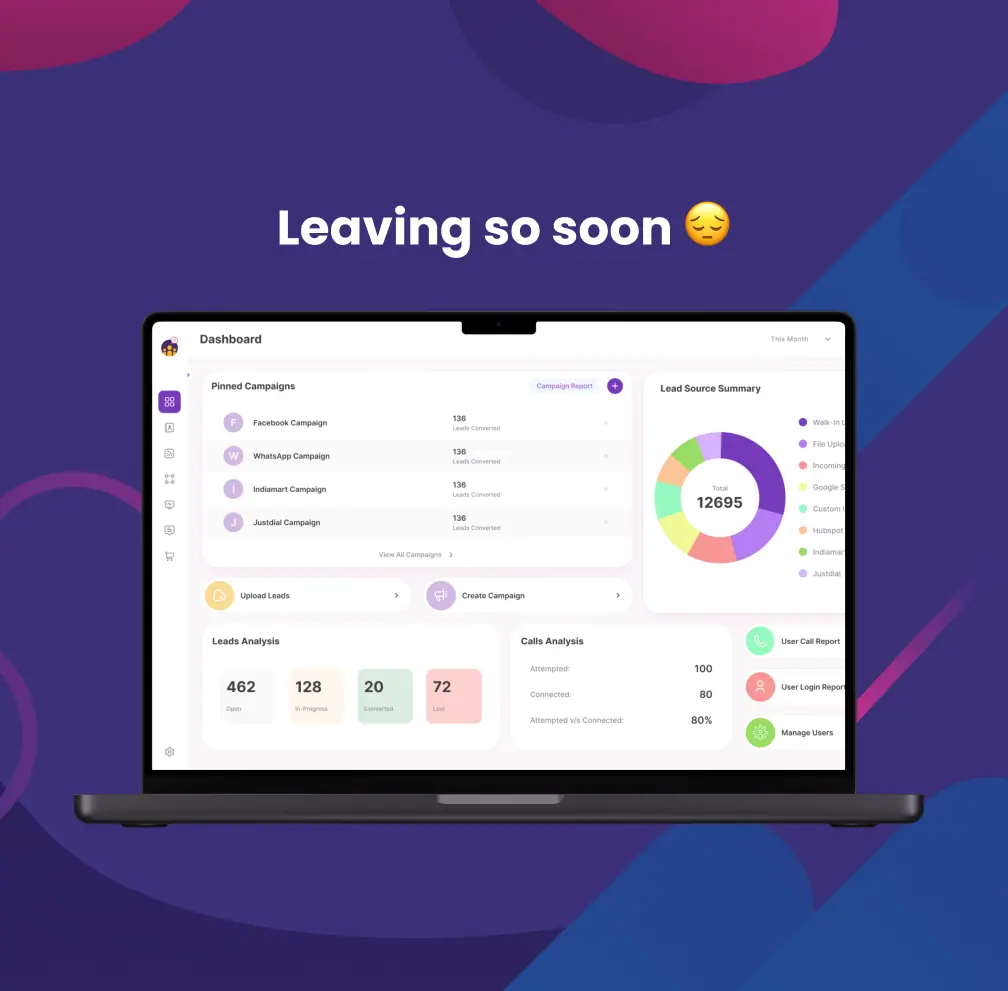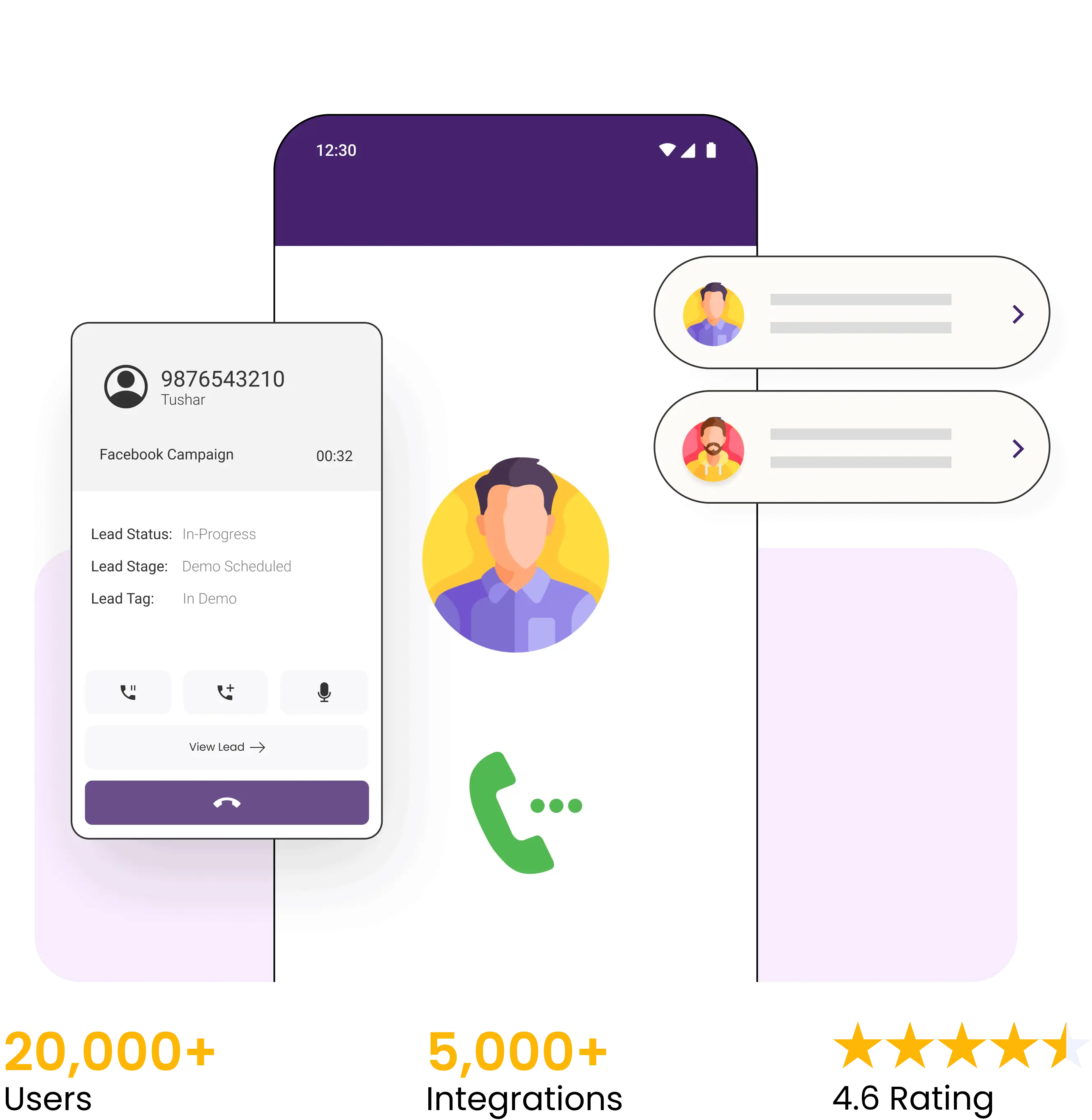FREE GUIDE
Get your copy of the ultimate guide to lead generation through telecalling (scripts included)

“CRM” certainly is a buzzword in the modern business world. But, what does CRM really mean, and why is it so important?
In this article, you will not only have a firm understanding of CRM but also its types. Moreover, we will also examine the different types of CRM software.
By the end, you’ll have all the information you’ll need to choose the right CRM for your business.
Customer Relationship Management (CRM) refers to a strategy used by businesses. It is responsible for managing both your current and potential customer relationships by collecting and analyzing data.
Furthermore, CRM also refers to all strategies, tools and techniques utilized by businesses for developing, retaining, and acquiring customers.
CRM is very important as it helps you improve conversations with your customers. Not only this, it also offers customers a more personalized experience when interacting with your business.
Now that you have a firm grasp on CRM, let’s take a look at the different types of CRM.
CRM products prove quite helpful in organizing all of your customer information. CRM products do tend to vary in terms of features offered and can broadly be categorized into three main types – Operational, Analytical, and Collaborative.
Operational CRM focuses on automation, enhancement, and overall improvement of business processes.
Its main purpose is to generate leads and convert all of them into contacts. Alongside this, it also gathers necessary information and provides efficient service to all customers.
Moreover, it assists with the management of the daily activities of your company teams.
For example, in the case of representatives manually entering customer information. A CRM would automatically insert all of the customer’s contact information directly onto the platform being used.
Furthermore, it also streamlines the business processes that involve sales, marketing, and service automation.
Operational CRM refers to services that provide support for a range of ‘front-office’ business processes. They help an organization cater to all the needs of its valuable customers.
As a result, operational CRMs work well with businesses with short sales cycles.
Analytical CRMs assemble and manage large amounts of data in order to gain insights on the entire customer experience. They help management, marketing, sales, and support representatives to find and understand the best way to serve customers.
The primary function of analytical CRMs is data analysis. For example, they help businesses analyze past buying behavior by using CRM to determine what campaigns should be rolled out for different segments of customers.
Some of their main features include gathering and analyzing customer data from multiple channels in a structured manner and analyzing Key Performance Indicators (KPIs) set by the business. In addition to this, they also help to put in place a set business process in sales, marketing, and support to noticeably improve customer relationships and loyalty.
Analytical CRMs support organization ‘back-office’ operations and analysis, as well as handle all the processes and operations that do not involve directly dealing with customers.
For these reasons, analytical CRMs prove very helpful for companies with a lot of data points and heavy competition.
It assists in connecting communication across a business’ marketing, sales, and support departments.
Collaborative CRMs enable organizations to share and access the same customers’ information across multiple business units. For example, sales, tech, support, etc.
This shared information highlights a better understanding of customers as well as their needs. For instance, feedback from a support team would be quite helpful for the marketing team to help target customers.
It is also known as the ‘strategic CRM’. They ensure that your teams all have access to the same up-to-date data regarding customers. This is irrespective of which department or channel they work in.
As a whole, collaborative CRMs help unite all business groups. Furthermore, they aim to use all the information they have about customers to increase customer loyalty.
As a whole, collaborative CRMs help unite all business groups and aim to use all the information they have about customers to increase customer loyalty as well as acquire new customers.
You may be wondering, do I really need to invest in all three CRMs?
Quite frankly, what type of CRM you need for your business depends entirely on your specific business needs.
For companies seeking to grow and who want to increase efficiency, operational CRMs could prove to be extremely useful. Operational CRMs work well with businesses with short sales cycles.
If your business handles large volumes of customer data from multiple channels, analytical CRMs prove very helpful.
Collaborative CRM are most suited for businesses with many departments situated in different locations.
Recently, there are even newer and more platforms of CRM such as telecalling CRM and mobile CRM.
Telecalling CRM mainly refers to a platform that is specifically tailored for the telecalling process. It is made up of only the most important features, without being overly complicated.
Meanwhile, mobile CRM aims to make it possible for employees to work from anywhere. It enables them to do all that they can do with a laptop on mobile remotely.
CRM software are very useful tools that greatly enhance the visibility of the current operations. Simultaneously, they also help you keep track of potential sales and partnerships on the back-end of the business.
CRM tools are mainly classified into two categories. They are:
On-premise CRM software:
This software is preferred by companies that handle sensitive customer information such as health care or financial institutions. These systems are somewhat rigid in terms of their functionality as adding new features is often expensive.
Cloud-based CRM software:
Businesses can use cloud-based CRM at a monthly recurring cost. In comparison to on-premise CRMs, cloud CRMs are preferred as they are budget-friendly and just generally more flexible. In the case of these services, the service provider offers maintenance as well as data security.
Operational CRM Software:
It allows you to track your customers’ journey through their activities such as lead generation, contact management, and marketing automation.
Analytical CRM Software:
It offers functions that help with data management, retention activities as well as customer acquisition through processes like data mining, sales forecasting, etc.
Collaborative CRM Software:
It enables customers to share customer data across internal departments and external stakeholders (partners, vendors, etc.) aiming to enhance the overall Customer Experience (CX).
Read: Best Mobile CRM apps
NeoDove is a telecalling CRM that aims to help small and medium businesses build strong connections with their customers. It enhances their telecalling team’s productivity alongside their performance to increase revenue generated.
It is equipped with many useful features like an automatic dialer, multichannel communication, lead management system, IVR, etc. Moreover, it enables end-to-end communications between businesses and their customers.
Zoho is a CRM software system that helps businesses with customer engagement, revenue generation and converting more leads.
It acts as a centralized location to combine your business’ marketing, sales and customer support activities. Thus, allowing you to streamline your business processes all on a single platform.
HubSpot is a free CRM software that is equipped with various tools to help everyone on your team.
It enables you to track as well as analyze sales activity in real time. Moreover, it arms your sales team with many time-saving tools. Thus, making your job easier.
Salesforce is one of the most popular CRM platforms. It helps the marketing, commerce, sales and service teams within your business to work together, even remotely.
It attracts more buyers with the use of personalized marketing. Additionally, it also helps your team respond faster to customer issues. Overall, Salesforce aims to bring companies and customers closer together.
Pipedrive is a sales CRM that is designed for salespeople across all industries. Its main aim is to improve the overall sales quality alongside sales communication of an organization.
Moreover, it assists companies in driving more sales and leads. It is largely preferred by organizations that would like a more visual-based pipeline management system.
In conclusion, CRM is a very important and highly useful strategy to utilize in modern business. Different types of CRM play a valuable role in enhancing your business operations and processes.
Moreover, CRM platforms allow for the storage of current and prospect-related information all in one centralized location.
Thus, CRM software tools prove absolutely essential for easy management of internal and external business relationships. Not only this, but it also helps in the easy organization of all customer data.
With this article, you’ve got a better understanding of the different types of CRM software. As such, you’re more than ready to choose the best CRM for you and your business.




95% business who use NeoDove report 3x more profits!
Happy Customers
107k reviews

These outcomes and beyond can be yours.
Lead Leakage
Increase in call attempts
More Engagement



FREE GUIDE
Get your copy of the ultimate guide to lead generation through telecalling (scripts included)